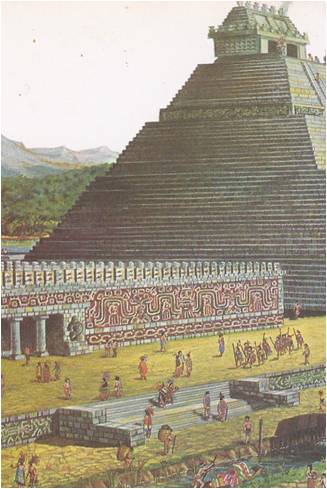VETERANS or the Union Army, returning to their home towns in New England or the Middle Atlantic states after the war were surprised at what they saw. They had grown up in towns where most of the people lived by farming, while the rest sold things to farmers or worked in local workshops. Perhaps a mill and a factory had stood on the bank of the town’s river. The farms, stores and workshops remained, but now there were many new brick buildings used for factories, mills and warehouses. American industry, concentrated in the river valleys and ocean ports of the …
Read More »Europe Divided 1825 -1881
IN EUROPE and North America, nationalism generally led to the creation of larger states and the centralization of power. In the Austrian Empire, however, nationalism had the opposite effect; it led to the break-up of the empire and the creation of a large number of small states. The reason was that the Austrian Empire was made up of people of different nationalities, each with its own language and customs. Although the German-speaking Austrians were only about one-fifth of the total population, the ruling family, the Hapsburgs, was Austrian and Austrians held most of the important government positions. The German-speaking people …
Read More »Democracy in Latin America 1811-1823
DURING THE years when Napoleon and Spain were at war, Spain’s American colonies began their long fight to win independence from the mother country. Some of the earliest revolts were quickly defeated. The leaders were executed, but their deeds were remembered. In the early 1800’s, the leader of an unsuccessful revolt in Bolivia said, as he faced death: “I die; but the torch which I have lighted no one will be able to extinguish.” Francisco Miranda won fame for his unsuccessful revolt in Venezuela in 1811 and 1812. In Mexico, an old priest named Miguel Hidalgo, who wanted freedom for …
Read More »Democracy and Nationalism 1815-1848
WHILE THE Industrial Revolution was transforming England and creating a new kind of society, the continent of Europe seemed to be going backward instead of forward. After Napoleon’s defeat in 1815, the monarchs and aristocrats brought back the principle of “legitimacy.” Legitimacy meant that only kings, aristocrats and the established church had the right to rule and that the people must obey them without question. The American and French revolutions had been fought to overthrow the principle of legitimacy. The idea behind these revolutions was that governments were created by the people. As the Declaration of Independence put it, all …
Read More »Men against Machines 1733 – 1812
FEAR HUNG over the Yorkshire countryside in northern England. It was the spring of 1812, a spring the people would long remember. Hardly a night passed without some frightened countryman hearing the tramp of marching feet or the sound of gunfire. Sometimes shouts rang out and flames lit up the sky as some building was mysteriously set on fire. The most frightening sound of all was a gentle tapping on a cottage door in the dead of night. The man who heard it knew what it meant — a visit from members of a secret society of mill workers. Why …
Read More »The Rise of Napoleon Bonaparte 1796-1802
In March of 1796, a new commander named Napoleon Bonaparte was placed in charge of the French army on the Italian front. The soldiers and officers were amazed when they first saw him. He was short, thin, pale, only twenty-seven years old and spoke French with an Italian accent. Napoleon was not an unknown. He had first come to public attention as the young artillery officer who drove the British fleet from the harbour at Toulon. Later, as a brigadier general, he had successfully defended the Convention from an uprising in Paris. What most people did not know was that …
Read More »Adventures in the New World 1519 – 1620
“I DID NOT come to till the soil like a peasant,” said Hernando Cortez. “I came to find gold.” His words echoed the thoughts of almost every Spaniard in the New World. The discovery of the sea route to the West had set off a great treasure hunt. Colonizing and slaughtering, building and plundering, the gold-hungry Spaniards won a Spanish Empire of the West. Conquistadores‚ they were called — the conquerors. None of the treasure-hunters was more cunning or ambitious than Hernando Cortez‚ who came to the island of Hispaniola in 1504. It was not until 1519 that the governor …
Read More »Fury from the North 814-1042
“. . FROM THE FURY OF THE NORTHMEN, Good Lord, deliver us.” Until recent times, this line was included in the prayer book used by the Church of England. The raids of the Norse Vikings on Britain were so terrible that the victims never forgot them. For generations the memory of the savage Norsemen was kept alive and Englishmen repeated this prayer for more than a thousand years. It was not only Britain that felt the fury of the Norsemen; they raided the European continent as well. The Norsemen’s ships themselves seemed to threaten terror. The hull of a Viking …
Read More »The Abbasids: Glory and Decay 750 -1258 A. D.
UNDER THE Omayyads, who ruled from 661 to 750, Islam had grown into a mighty empire. Arabic had become its language, while the Arabs, in turn, had picked up useful skills from the peoples they had conquered. The state had grown rich from the tribute paid by non-Moslems and the land tax paid by landowners. Though the caliphs were mainly concerned with pleasure and power, they had not neglected religion completely. They had built the Dome of the Rock in Jerusalem and the Omayyad Mosque in Damascus — two magnificent sanctuaries which were the holiest places in Islam after the …
Read More »







